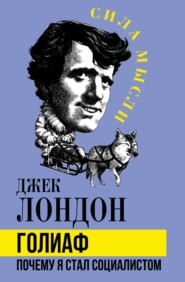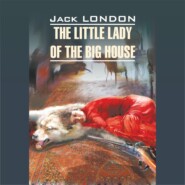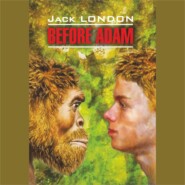По всем вопросам обращайтесь на: info@litportal.ru
(©) 2003-2025.
✖
White Fang
Настройки чтения
Размер шрифта
Высота строк
Поля
One of the Indians arose and walked over to him and stooped above him. The cub cowered closer to the ground. It was the unknown, objectified at last, in concrete flesh and blood, bending over him and reaching down to seize hold of him. His hair bristled involuntarily; his lips writhed back and his little fangs were bared. The hand, poised like doom above him, hesitated, and the man spoke laughing, “Wabam wabisca ip pit tah.” (“Look! The white fangs!”)
The other Indians laughed loudly, and urged the man on to pick up the cub. As the hand descended closer and closer, there raged within the cub a battle of the instincts. He experienced two great impulsions – to yield and to fight. The resulting action was a compromise. He did both. He yielded till the hand almost touched him. Then he fought, his teeth flashing in a snap that sank them into the hand. The next moment he received a clout alongside the head that knocked him over on his side. Then all fight fled out of him. His puppyhood and the instinct of submission took charge of him. He sat up on his haunches and ki-yi’d. But the man whose hand he had bitten was angry. The cub received a clout on the other side of his head. Whereupon he sat up and ki-yi’d louder than ever.
The four Indians laughed more loudly, while even the man who had been bitten began to laugh. They surrounded the cub and laughed at him, while he wailed out his terror and his hurt. In the midst of it, he heard something. The Indians heard it too. But the cub knew what it was, and with a last, long wail that had in it more of triumph than grief, he ceased his noise and waited for the coming of his mother, of his ferocious and indomitable mother who fought and killed all things and was never afraid. She was snarling as she ran. She had heard the cry of her cub and was dashing to save him.
She bounded in amongst them, her anxious and militant motherhood making her anything but a pretty sight. But to the cub the spectacle of her protective rage was pleasing. He uttered a glad little cry and bounded to meet her, while the man-animals went back hastily several steps. The she-wolf stood over against her cub, facing the men, with bristling hair, a snarl rumbling deep in her throat. Her face was distorted and malignant with menace, even the bridge of the nose wrinkling from tip to eyes so prodigious was her snarl.
Then it was that a cry went up from one of the men. “Kiche!” was what he uttered. It was an exclamation of surprise. The cub felt his mother wilting at the sound.
“Kiche!” the man cried again, this time with sharpness and authority.
And then the cub saw his mother, the she-wolf, the fearless one, crouching down till her belly touched the ground, whimpering, wagging her tail, making peace signs. The cub could not understand. He was appalled. The awe of man rushed over him again. His instinct had been true. His mother verified it. She, too, rendered submission to the man-animals.
The man who had spoken came over to her. He put his hand upon her head, and she only crouched closer. She did not snap, nor threaten to snap. The other men came up, and surrounded her, and felt her, and pawed her, which actions she made no attempt to resent. They were greatly excited, and made many noises with their mouths. These noises were not indication of danger, the cub decided, as he crouched near his mother still bristling from time to time but doing his best to submit.
“It is not strange,” an Indian was saying. “Her father was a wolf. It is true, her mother was a dog; but did not my brother tie her out in the woods all of three nights in the mating season? Therefore was the father of Kiche a wolf.”
“It is a year, Grey Beaver, since she ran away,” spoke a second Indian.
“It is not strange, Salmon Tongue,” Grey Beaver answered. “It was the time of the famine, and there was no meat for the dogs.”
“She has lived with the wolves,” said a third Indian.
“So it would seem, Three Eagles,” Grey Beaver answered, laying his hand on the cub; “and this be the sign of it.”
The cub snarled a little at the touch of the hand, and the hand flew back to administer a clout. Whereupon the cub covered its fangs, and sank down submissively, while the hand, returning, rubbed behind his ears, and up and down his back.
“This be the sign of it,” Grey Beaver went on. “It is plain that his mother is Kiche. But his father was a wolf. Wherefore is there in him little dog and much wolf. His fangs be white, and White Fang shall be his name. I have spoken. He is my dog. For was not Kiche my brother’s dog? And is not my brother dead?”
The cub, who had thus received a name in the world, lay and watched. For a time the man-animals continued to make their mouth-noises. Then Grey Beaver took a knife from a sheath that hung around his neck, and went into the thicket and cut a stick. White Fang watched him. He notched the stick at each end and in the notches fastened strings of raw-hide. One string he tied around the throat of Kiche. Then he led her to a small pine, around which he tied the other string.
White Fang followed and lay down beside her. Salmon Tongue’s hand reached out to him and rolled him over on his back. Kiche looked on anxiously. White Fang felt fear mounting in him again. He could not quite suppress a snarl, but he made no offer to snap. The hand, with fingers crooked and spread apart, rubbed his stomach in a playful way and rolled him from side to side. It was ridiculous and ungainly, lying there on his back with legs sprawling in the air. Besides, it was a position of such utter helplessness that White Fang’s whole nature revolted against it. He could do nothing to defend himself. If this man-animal intended harm, White Fang knew that he could not escape it. How could he spring away with his four legs in the air above him? Yet submission made him master his fear, and he only growled softly. This growl he could not suppress; nor did the man-animal resent it by giving him a blow on the head. And furthermore, such was the strangeness of it, White Fang experienced an unaccountable sensation of pleasure as the hand rubbed back and forth. When he was rolled on his side he ceased to growl, when the fingers pressed and prodded at the base of his ears the pleasurable sensation increased; and when, with a final rub and scratch, the man left him alone and went away, all fear had died out of White Fang. He was to know fear many times in his dealing with man; yet it was a token of the fearless companionship with man that was ultimately to be his.
After a time, White Fang heard strange noises approaching. He was quick in his classification, for he knew them at once for man-animal noises. A few minutes later the remainder of the tribe, strung out as it was on the march, trailed in. There were more men and many women and children, forty souls of them, and all heavily burdened with camp equipage and outfit. Also there were many dogs; and these, with the exception of the part-grown puppies, were likewise burdened with camp outfit. On their backs, in bags that fastened tightly around underneath, the dogs carried from twenty to thirty pounds of weight.
White Fang had never seen dogs before, but at sight of them he felt that they were his own kind, only somehow different. But they displayed little difference from the wolf when they discovered the cub and his mother. There was a rush. White Fang bristled and snarled and snapped in the face of the open-mouthed oncoming wave of dogs, and went down and under them, feeling the sharp slash of teeth in his body, himself biting and tearing at the legs and bellies above him. There was a great uproar. He could hear the snarl of Kiche as she fought for him; and he could hear the cries of the man-animals, the sound of clubs striking upon bodies, and the yelps of pain from the dogs so struck.
Only a few seconds elapsed before he was on his feet again. He could now see the man-animals driving back the dogs with clubs and stones, defending him, saving him from the savage teeth of his kind that somehow was not his kind. And though there was no reason in his brain for a clear conception of so abstract a thing as justice, nevertheless, in his own way, he felt the justice of the man-animals, and he knew them for what they were – makers of law and executors of law. Also, he appreciated the power with which they administered the law. Unlike any animals he had ever encountered, they did not bite nor claw. They enforced their live strength with the power of dead things. Dead things did their bidding. Thus, sticks and stones, directed by these strange creatures, leaped through the air like living things, inflicting grievous hurts upon the dogs.
To his mind this was power unusual, power inconceivable and beyond the natural, power that was godlike. White Fang, in the very nature of him, could never know anything about gods; at the best he could know only things that were beyond knowing – but the wonder and awe that he had of these man-animals in ways resembled what would be the wonder and awe of man at sight of some celestial creature, on a mountain top, hurling thunderbolts from either hand at an astonished world.
The last dog had been driven back. The hubbub died down. And White Fang licked his hurts and meditated upon this, his first taste of pack-cruelty and his introduction to the pack. He had never dreamed that his own kind consisted of more than One Eye, his mother, and himself. They had constituted a kind apart, and here, abruptly, he had discovered many more creatures apparently of his own kind. And there was a subconscious resentment that these, his kind, at first sight had pitched upon him and tried to destroy him. In the same way he resented his mother being tied with a stick, even though it was done by the superior man-animals. It savoured of the trap, of bondage. Yet of the trap and of bondage he knew nothing. Freedom to roam and run and lie down at will, had been his heritage; and here it was being infringed upon. His mother’s movements were restricted to the length of a stick, and by the length of that same stick was he restricted, for he had not yet got beyond the need of his mother’s side.
He did not like it. Nor did he like it when the man-animals arose and went on with their march; for a tiny man-animal took the other end of the stick and led Kiche captive behind him, and behind Kiche followed White Fang, greatly perturbed and worried by this new adventure he had entered upon.
They went down the valley of the stream, far beyond White Fang’s widest ranging, until they came to the end of the valley, where the stream ran into the Mackenzie River. Here, where canoes were cached on poles high in the air and where stood fish-racks for the drying of fish, camp was made; and White Fang looked on with wondering eyes. The superiority of these man-animals increased with every moment. There was their mastery over all these sharp-fanged dogs. It breathed of power. But greater than that, to the wolf-cub, was their mastery over things not alive; their capacity to communicate motion to unmoving things; their capacity to change the very face of the world.
It was this last that especially affected him. The elevation of frames of poles caught his eye; yet this in itself was not so remarkable, being done by the same creatures that flung sticks and stones to great distances. But when the frames of poles were made into tepees by being covered with cloth and skins, White Fang was astounded. It was the colossal bulk of them that impressed him. They arose around him, on every side, like some monstrous quick-growing form of life. They occupied nearly the whole circumference of his field of vision. He was afraid of them. They loomed ominously above him; and when the breeze stirred them into huge movements, he cowered down in fear, keeping his eyes warily upon them, and prepared to spring away if they attempted to precipitate themselves upon him.
But in a short while his fear of the tepees passed away. He saw the women and children passing in and out of them without harm, and he saw the dogs trying often to get into them, and being driven away with sharp words and flying stones. After a time, he left Kiche’s side and crawled cautiously toward the wall of the nearest tepee. It was the curiosity of growth that urged him on – the necessity of learning and living and doing that brings experience. The last few inches to the wall of the tepee were crawled with painful slowness and precaution. The day’s events had prepared him for the unknown to manifest itself in most stupendous and unthinkable ways. At last his nose touched the canvas. He waited. Nothing happened. Then he smelled the strange fabric, saturated with the man-smell. He closed on the canvas with his teeth and gave a gentle tug. Nothing happened, though the adjacent portions of the tepee moved. He tugged harder. There was a greater movement. It was delightful. He tugged still harder, and repeatedly, until the whole tepee was in motion. Then the sharp cry of a squaw inside sent him scampering back to Kiche. But after that he was afraid no more of the looming bulks of the tepees.
A moment later he was straying away again from his mother. Her stick was tied to a peg in the ground and she could not follow him. A part-grown puppy, somewhat larger and older than he, came toward him slowly, with ostentatious and belligerent importance. The puppy’s name, as White Fang was afterward to hear him called, was Lip-lip. He had had experience in puppy fights and was already something of a bully.
Lip-lip was White Fang’s own kind, and, being only a puppy, did not seem dangerous; so White Fang prepared to meet him in a friendly spirit. But when the strangers walk became stiff-legged and his lips lifted clear of his teeth, White Fang stiffened too, and answered with lifted lips. They half circled about each other, tentatively, snarling and bristling. This lasted several minutes, and White Fang was beginning to enjoy it, as a sort of game. But suddenly, with remarkable swiftness, Lip-lip leaped in, delivering a slashing snap, and leaped away again. The snap had taken effect on the shoulder that had been hurt by the lynx and that was still sore deep down near the bone. The surprise and hurt of it brought a yelp out of White Fang; but the next moment, in a rush of anger, he was upon Lip-lip and snapping viciously.
But Lip-lip had lived his life in camp and had fought many puppy fights. Three times, four times, and half a dozen times, his sharp little teeth scored on the newcomer, until White Fang, yelping shamelessly, fled to the protection of his mother. It was the first of the many fights he was to have with Lip-lip, for they were enemies from the start, born so, with natures destined perpetually to clash.
Kiche licked White Fang soothingly with her tongue, and tried to prevail upon him to remain with her. But his curiosity was rampant, and several minutes later he was venturing forth on a new quest. He came upon one of the man-animals, Grey Beaver, who was squatting on his hams and doing something with sticks and dry moss spread before him on the ground. White Fang came near to him and watched. Grey Beaver made mouth-noises which White Fang interpreted as not hostile, so he came still nearer.
Women and children were carrying more sticks and branches to Grey Beaver. It was evidently an affair of moment. White Fang came in until he touched Grey Beaver’s knee, so curious was he, and already forgetful that this was a terrible man-animal. Suddenly he saw a strange thing like mist beginning to arise from the sticks and moss beneath Grey Beaver’s hands. Then, amongst the sticks themselves, appeared a live thing, twisting and turning, of a colour like the colour of the sun in the sky. White Fang knew nothing about fire. It drew him as the light, in the mouth of the cave had drawn him in his early puppyhood. He crawled the several steps toward the flame. He heard Grey Beaver chuckle above him, and he knew the sound was not hostile. Then his nose touched the flame, and at the same instant his little tongue went out to it.
For a moment he was paralysed. The unknown, lurking in the midst of the sticks and moss, was savagely clutching him by the nose. He scrambled backward, bursting out in an astonished explosion of ki-yi’s. At the sound, Kiche leaped snarling to the end of her stick, and there raged terribly because she could not come to his aid. But Grey Beaver laughed loudly, and slapped his thighs, and told the happening to all the rest of the camp, till everybody was laughing uproariously. But White Fang sat on his haunches and ki-yi’d and ki-yi’d, a forlorn and pitiable little figure in the midst of the man-animals.
It was the worst hurt he had ever known. Both nose and tongue had been scorched by the live thing, sun-coloured, that had grown up under Grey Beaver’s hands. He cried and cried interminably, and every fresh wail was greeted by bursts of laughter on the part of the man-animals. He tried to soothe his nose with his tongue, but the tongue was burnt too, and the two hurts coming together produced greater hurt; whereupon he cried more hopelessly and helplessly than ever.
And then shame came to him. He knew laughter and the meaning of it. It is not given us to know how some animals know laughter, and know when they are being laughed at; but it was this same way that White Fang knew it. And he felt shame that the man-animals should be laughing at him. He turned and fled away, not from the hurt of the fire, but from the laughter that sank even deeper, and hurt in the spirit of him. And he fled to Kiche, raging at the end of her stick like an animal gone mad – to Kiche, the one creature in the world who was not laughing at him.
Twilight drew down and night came on, and White Fang lay by his mother’s side. His nose and tongue still hurt, but he was perplexed by a greater trouble. He was homesick. He felt a vacancy in him, a need for the hush and quietude of the stream and the cave in the cliff. Life had become too populous. There were so many of the man-animals, men, women, and children, all making noises and irritations. And there were the dogs, ever squabbling and bickering, bursting into uproars and creating confusions. The restful loneliness of the only life he had known was gone. Here the very air was palpitant with life. It hummed and buzzed unceasingly. Continually changing its intensity and abruptly variant in pitch, it impinged on his nerves and senses, made him nervous and restless and worried him with a perpetual imminence of happening.
He watched the man-animals coming and going and moving about the camp. In fashion distantly resembling the way men look upon the gods they create, so looked White Fang upon the man-animals before him. They were superior creatures, of a verity, gods. To his dim comprehension they were as much wonder-workers as gods are to men. They were creatures of mastery, possessing all manner of unknown and impossible potencies, overlords of the alive and the not alive – making obey that which moved, imparting movement to that which did not move, and making life, sun-coloured and biting life, to grow out of dead moss and wood. They were fire-makers! They were gods.
CHAPTER II – THE BONDAGE
The days were thronged with experience for White Fang. During the time that Kiche was tied by the stick, he ran about over all the camp, inquiring, investigating, learning. He quickly came to know much of the ways of the man-animals, but familiarity did not breed contempt. The more he came to know them, the more they vindicated their superiority, the more they displayed their mysterious powers, the greater loomed their god-likeness.
To man has been given the grief, often, of seeing his gods overthrown and his altars crumbling; but to the wolf and the wild dog that have come in to crouch at man’s feet, this grief has never come. Unlike man, whose gods are of the unseen and the overguessed, vapours and mists of fancy eluding the garmenture of reality, wandering wraiths of desired goodness and power, intangible out-croppings of self into the realm of spirit – unlike man, the wolf and the wild dog that have come in to the fire find their gods in the living flesh, solid to the touch, occupying earth-space and requiring time for the accomplishment of their ends and their existence. No effort of faith is necessary to believe in such a god; no effort of will can possibly induce disbelief in such a god. There is no getting away from it. There it stands, on its two hind-legs, club in hand, immensely potential, passionate and wrathful and loving, god and mystery and power all wrapped up and around by flesh that bleeds when it is torn and that is good to eat like any flesh.
And so it was with White Fang. The man-animals were gods unmistakable and unescapable. As his mother, Kiche, had rendered her allegiance to them at the first cry of her name, so he was beginning to render his allegiance. He gave them the trail as a privilege indubitably theirs. When they walked, he got out of their way. When they called, he came. When they threatened, he cowered down. When they commanded him to go, he went away hurriedly. For behind any wish of theirs was power to enforce that wish, power that hurt, power that expressed itself in clouts and clubs, in flying stones and stinging lashes of whips.
He belonged to them as all dogs belonged to them. His actions were theirs to command. His body was theirs to maul, to stamp upon, to tolerate. Such was the lesson that was quickly borne in upon him. It came hard, going as it did, counter to much that was strong and dominant in his own nature; and, while he disliked it in the learning of it, unknown to himself he was learning to like it. It was a placing of his destiny in another’s hands, a shifting of the responsibilities of existence. This in itself was compensation, for it is always easier to lean upon another than to stand alone.
But it did not all happen in a day, this giving over of himself, body and soul, to the man-animals. He could not immediately forego his wild heritage and his memories of the Wild. There were days when he crept to the edge of the forest and stood and listened to something calling him far and away. And always he returned, restless and uncomfortable, to whimper softly and wistfully at Kiche’s side and to lick her face with eager, questioning tongue.
White Fang learned rapidly the ways of the camp. He knew the injustice and greediness of the older dogs when meat or fish was thrown out to be eaten. He came to know that men were more just, children more cruel, and women more kindly and more likely to toss him a bit of meat or bone. And after two or three painful adventures with the mothers of part-grown puppies, he came into the knowledge that it was always good policy to let such mothers alone, to keep away from them as far as possible, and to avoid them when he saw them coming.
But the bane of his life was Lip-lip. Larger, older, and stronger, Lip-lip had selected White Fang for his special object of persecution. White Fang fought willingly enough, but he was outclassed. His enemy was too big. Lip-lip became a nightmare to him. Whenever he ventured away from his mother, the bully was sure to appear, trailing at his heels, snarling at him, picking upon him, and watchful of an opportunity, when no man-animal was near, to spring upon him and force a fight. As Lip-lip invariably won, he enjoyed it hugely. It became his chief delight in life, as it became White Fang’s chief torment.
But the effect upon White Fang was not to cow him. Though he suffered most of the damage and was always defeated, his spirit remained unsubdued. Yet a bad effect was produced. He became malignant and morose. His temper had been savage by birth, but it became more savage under this unending persecution. The genial, playful, puppyish side of him found little expression. He never played and gambolled about with the other puppies of the camp. Lip-lip would not permit it. The moment White Fang appeared near them, Lip-lip was upon him, bullying and hectoring him, or fighting with him until he had driven him away.
The effect of all this was to rob White Fang of much of his puppyhood and to make him in his comportment older than his age. Denied the outlet, through play, of his energies, he recoiled upon himself and developed his mental processes. He became cunning; he had idle time in which to devote himself to thoughts of trickery. Prevented from obtaining his share of meat and fish when a general feed was given to the camp-dogs, he became a clever thief. He had to forage for himself, and he foraged well, though he was oft-times a plague to the squaws in consequence. He learned to sneak about camp, to be crafty, to know what was going on everywhere, to see and to hear everything and to reason accordingly, and successfully to devise ways and means of avoiding his implacable persecutor.
It was early in the days of his persecution that he played his first really big crafty game and got there from his first taste of revenge. As Kiche, when with the wolves, had lured out to destruction dogs from the camps of men, so White Fang, in manner somewhat similar, lured Lip-lip into Kiche’s avenging jaws. Retreating before Lip-lip, White Fang made an indirect flight that led in and out and around the various tepees of the camp. He was a good runner, swifter than any puppy of his size, and swifter than Lip-lip. But he did not run his best in this chase. He barely held his own, one leap ahead of his pursuer.
Lip-lip, excited by the chase and by the persistent nearness of his victim, forgot caution and locality. When he remembered locality, it was too late. Dashing at top speed around a tepee, he ran full tilt into Kiche lying at the end of her stick. He gave one yelp of consternation, and then her punishing jaws closed upon him. She was tied, but he could not get away from her easily. She rolled him off his legs so that he could not run, while she repeatedly ripped and slashed him with her fangs.
When at last he succeeded in rolling clear of her, he crawled to his feet, badly dishevelled, hurt both in body and in spirit. His hair was standing out all over him in tufts where her teeth had mauled. He stood where he had arisen, opened his mouth, and broke out the long, heart-broken puppy wail. But even this he was not allowed to complete. In the middle of it, White Fang, rushing in, sank his teeth into Lip-lip’s hind leg. There was no fight left in Lip-lip, and he ran away shamelessly, his victim hot on his heels and worrying him all the way back to his own tepee. Here the squaws came to his aid, and White Fang, transformed into a raging demon, was finally driven off only by a fusillade of stones.
Came the day when Grey Beaver, deciding that the liability of her running away was past, released Kiche. White Fang was delighted with his mother’s freedom. He accompanied her joyfully about the camp; and, so long as he remained close by her side, Lip-lip kept a respectful distance. White-Fang even bristled up to him and walked stiff-legged, but Lip-lip ignored the challenge. He was no fool himself, and whatever vengeance he desired to wreak, he could wait until he caught White Fang alone.

















